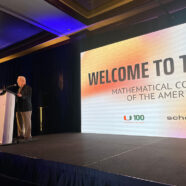
The conference brings together mathematicians from all over the American continent and our center was one of its main sponsors.
Last week, the Mathematical Congress of the Americas, MCA 2025, was held in Miami, USA. Organized by the Department of Mathematics of the University of Miami, it brought together specialists from all over the continent, contributing to stimulate collaboration between researchers, students, institutions and societies in the area from different countries.
In this context, 17 members of the Center for Mathematical Modeling (CMM) participated in this outstanding event in a variety of roles.


In this regard, CMM director Héctor Ramírez commented that “the MCA is an event that brings together mathematicians from all over the Americas every four years, being a tremendous opportunity to learn about the advances in the region in the different disciplines of mathematics”.
“Therefore,” he continued, “having an important representation from the CMM positions us institutionally and allows our researchers to present their work in a highly exposed environment.”
Ramírez organized the special session ‘Optimization and Control’ together with María Soledad Aronna (Fundação Getúlio Vargas of Brazil) –which included 14 speakers– and, in his role as director of the CMM, he was also a member of the Mathematical Council of the Americas (MCofA). “This council”, he explained, “has the responsibility of following up on the activities generated by the participating institutions, the most relevant of which is the organization of the MCA itself”.

Meanwhile, Daniel Remenik, principal investigator of the CMM, participated as an invited speaker and was a member of the special sessions committee. “I described in a general way the area in which I work (random growth models) and presented several of the results I have obtained during the last years together with collaborators”, he detailed about the contents included in his presentation ‘One dimensional random growth and the KPZ fixed point’. “Since it was a talk for a broad mathematical audience, I tried not to go into too much detail to make it accessible to non-experts,” he explained.
“It was an honor to be able to present an invited talk, which allows me to show my work and area of research to a broader group of mathematicians”, Remenik emphasized, “in addition, I was able to present a talk in one of the thematic sessions where I spoke on a different topic. Beyond that, these instances are valuable because they allow meeting and reuniting with colleagues from all over the world, as well as getting to know other researchers”.
As for the massive presence of researchers from the Center in this meeting of international coverage, Remenik said that it is “a good reflection of the weight that the CMM has in the development of mathematics in the continent”.

Talk by Matías Pavez-Signé, CMM/UChile associate researcher.
Among the CMM members who presented talks at the meeting were also Mauricio Sepúlveda from the U. de Concepción and Laura Jiménez from the U. de Chile.
Sepúlveda participated in session 19 ‘Nonlinear Evolution Equations: Trends in Control Theory and Related Topics’, invited by two Brazilian scientists with whom he has a history of collaboration and who were in charge of organizing the session: Roberto Capistrano-Filho (U. Federal de Pernambuco) and Valeria Cavalcanti (U. Estadual de Maringá). “The topic was quite theoretical, but my contribution was on ‘Inverse Problems for Biology Models’. That was the title of my talk, which is a somewhat more applied topic and is the result of my sabbatical in France. It was a massive congress, with quite varied and interesting topics”, he said.

Talk by Mauricio Sepúlveda, CMM/UdeC associate researcher.
“Within the session in which I participated, there were several talks on controllability issues with very interesting and new approaches for me, from a rather theoretical point of view. It was very pleasant to share with my Brazilian and Chilean colleagues in this area, both from a human and scientific point of view”, he added.
Laura Jiménez participated in the session ‘Recent Advances in Mathematical Ecology and Epidemiology’, presenting “the results of an article published last year, whose objective was to build a statistical model that would allow comparing the efficiency (or precision) of different sampling methods used to collect abundance data from which to estimate the population density of a species of interest. This work highlights the importance of building first-principles models that help ecologists collect better quality data”.

About her participation in the MCA, Laura highlights “having had the opportunity to present my research work and make it known to a mixed audience –mathematicians, statisticians and biologists–”, in addition to “extending my collaborative networks by interacting with researchers from all over the continent. In particular, I was able to interact with some colleagues from the United States, Mexico and Chile, with whom I will seek to work on research projects in the future”.
The complete list of CMM members who participated in MCA 2025 is:
|
|
By Iván Tobar Bocaz, CMM Communications
Posted on Jul 31, 2025 in News




 Noticias en español
Noticias en español
